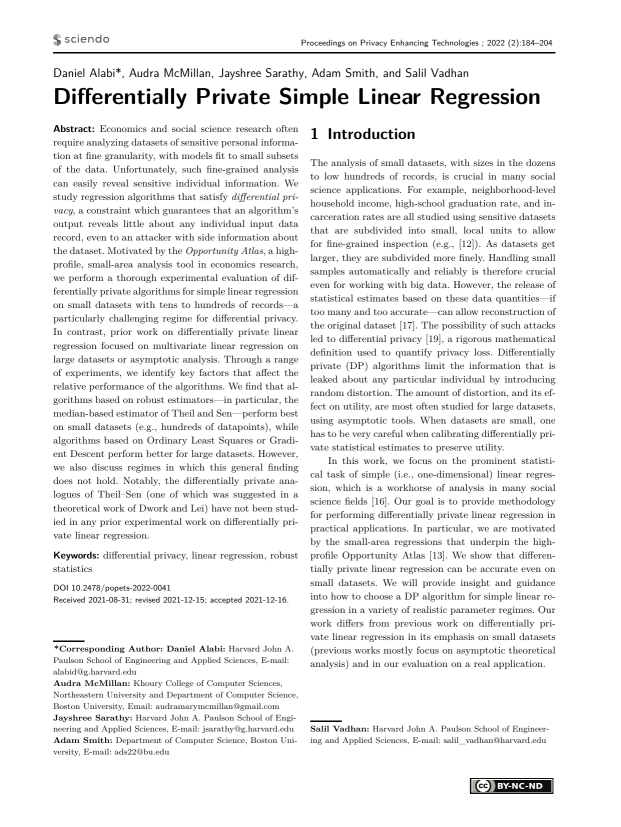Differentially Private Simple Linear Regression
Authors: Daniel Alabi (Harvard John A. Paulson School of Engineering and Applied Sciences), Audra McMillan (Khoury College of Computer Sciences, Northeastern University and Department of Computer Science, Boston University), Jayshree Sarathy (Harvard John A. Paulson School of Engineering and Applied Sciences), Adam Smith (Department of Computer Science, Boston University), Salil Vadhan (Harvard John A. Paulson School of Engineering and Applied Sciences)
Volume: 2022
Issue: 2
Pages: 184–204
DOI: https://doi.org/10.2478/popets-2022-0041
Abstract: Economics and social science research often require analyzing datasets of sensitive personal information at fine granularity, with models fit to small subsets of the data. Unfortunately, such fine-grained analysis can easily reveal sensitive individual information. We study regression algorithms that satisfy differential privacy, a constraint which guarantees that an algorithm’s output reveals little about any individual input data record, even to an attacker with side information about the dataset. Motivated by the Opportunity Atlas, a highprofile, small-area analysis tool in economics research, we perform a thorough experimental evaluation of differentially private algorithms for simple linear regression on small datasets with tens to hundreds of records—a particularly challenging regime for differential privacy. In contrast, prior work on differentially private linear regression focused on multivariate linear regression on large datasets or asymptotic analysis. Through a range of experiments, we identify key factors that affect the relative performance of the algorithms. We find that algorithms based on robust estimators—in particular, the median-based estimator of Theil and Sen—perform best on small datasets (e.g., hundreds of datapoints), while algorithms based on Ordinary Least Squares or Gradient Descent perform better for large datasets. However, we also discuss regimes in which this general finding does not hold. Notably, the differentially private analogues of Theil–Sen (one of which was suggested in a theoretical work of Dwork and Lei) have not been studied in any prior experimental work on differentially private linear regression.
Keywords: differential privacy, linear regression, robust statistics
Copyright in PoPETs articles are held by their authors. This article is published under a Creative Commons Attribution-NonCommercial-NoDerivs 3.0 license.

